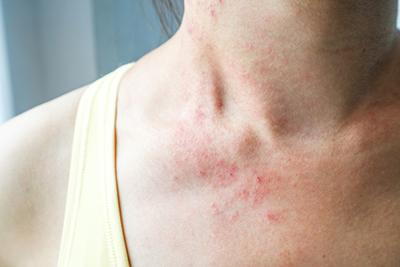
A skin rash is one of the most common skin conditions your dermatologist treats. A skin rash can develop occasionally and go away without treatment. A skin rash can also stay around and become a chronic problem which needs treatment.
A skin rash can take on many forms, including:
- Red, swollen bumps
- Painful, pus-filled cysts
- Diffuse, surface-level redness
A skin rash can also cover different parts of your body, including your face, neck, chest, back, shoulders, and legs.
Some examples of occasional rashes include:
- Exposure to harsh chemicals, like alcohol
- Exposure to an allergen, like certain foods
- Environmental exposure, like poison ivy
- Exposure to the elements, including wind, heat, and cold
These types of rashes may be treated with:
- Antibiotics, if the rash has caused an infection
- Cortisone cream, to reduce itching
- Oral corticosteroids, to decrease redness, swelling, and itching
- Aveeno or oatmeal baths, to reduce itching
- Prescription antihistamines to decrease itching
If your rash becomes chronic, it could be a sign of:
- Eczema
- Psoriasis
- Rosacea
For a chronic rash due to an underlying medical condition, your dermatologist may recommend the same treatments listed above, along with:
- Laser light and heat therapy to fade away the rash
- Topical creams to reduce the appearance of blemishes
- Prescription medications to reduce breakouts
A skin rash is also associated with serious medical conditions like lupus erythematosus. For this reason, when you have a persistent rash, you should visit a skin specialist–your dermatologist. The dermatologist may want to order laboratory testing or take a small sample of tissue to be sent off for a biopsy.
Depending on the results, your dermatologist may refer you to another specialist for further evaluation and treatment, but it all begins with a visit to your dermatologist.
In addition to diagnosis and treatment of skin rashes, you should also visit your dermatologist for:
- Acne breakouts
- Early signs of aging
- Moles and other skin growths
To learn more about different types of rashes and their treatments, talk with an expert. Call your dermatologist now.
